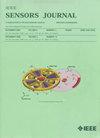基于差分进化优化模糊逻辑控制器和D-Star算法的wsn聚类路由
IF 4.3
2区 综合性期刊
Q1 ENGINEERING, ELECTRICAL & ELECTRONIC
引用次数: 0
摘要
无线传感器网络(WSNs)具有部署方便、数据采集高效等优点,是物联网的重要组成部分。然而,无线传感器网络在能源效率和延长网络寿命方面面临着重大挑战。为了减轻这些局限性,本工作引入了一种差分进化优化模糊逻辑控制器和D-star (DEFLCD)算法,用于WSNs中的聚类路由。首先,结合基于SPM混沌映射的种群初始化方法、自适应比例因子、交叉概率和精英个体选择策略对差分进化(DE)算法进行了改进,提高了算法的开发能力;其次,利用优化后的DE算法对模糊逻辑控制器(FLC)的输出隶属度函数进行细化;提出了一种创新的适应度度量来量化优化后的FLC在提高集群性能方面的有效性,从而增强动态网络环境下的操作适应性和鲁棒性。在数据包转发阶段,D-star方法动态地将拥塞节点分类为路由障碍,并在簇头(CHs)和基站之间建立节能的多跳链路,从而在大型网络基础设施中实现平衡的能源利用和改进的可扩展性。仿真结果表明,该算法在各种网络性能评估指标上优于现有算法,为大规模监控应用提供了一种节能的路由解决方案。本文章由计算机程序翻译,如有差异,请以英文原文为准。
Differential Evolution Optimized Fuzzy Logic Controller and D-Star Algorithm for Clustering Routing in WSNs
Wireless sensor networks (WSNs), with advantages, such as easy deployment and efficient data collection, constitute a critical component of the Internet of Things. However, WSNs face significant challenges in energy efficiency and prolonging network lifetime. To mitigate these identified limitations, the present work introduces a differential evolution optimized fuzzy logic controller and D-star (DEFLCD) algorithm for clustering routing in WSNs. First, the differential evolution (DE) algorithm is enhanced by integrating a population initialization method based on the SPM chaotic map, along with adaptive scaling factors, crossover probabilities, and an elite individual selection strategy, thereby improving the algorithm’s exploitation capability. Second, the optimized DE algorithm is employed to refine the output membership functions of the fuzzy logic controller (FLC). An innovative fitness metric is formulated to quantify the optimized FLC’s efficacy in improving cluster performance, thereby enhancing operational adaptability and robustness in dynamic networking environments. In the packet forwarding stage, the D-star methodology dynamically classifies congested nodes as routing barriers and establishes power-efficient multihop links between cluster heads (CHs) and the base station, achieving balanced energy utilization and improved scalability across large-scale network infrastructures. The simulation outcomes show that DEFLCD surpasses the existing algorithms in various network performance assessment metrics, offering an energy-efficient routing solution for large-scale monitoring applications.
求助全文
通过发布文献求助,成功后即可免费获取论文全文。
去求助
来源期刊

IEEE Sensors Journal
工程技术-工程:电子与电气
CiteScore
7.70
自引率
14.00%
发文量
2058
审稿时长
5.2 months
期刊介绍:
The fields of interest of the IEEE Sensors Journal are the theory, design , fabrication, manufacturing and applications of devices for sensing and transducing physical, chemical and biological phenomena, with emphasis on the electronics and physics aspect of sensors and integrated sensors-actuators. IEEE Sensors Journal deals with the following:
-Sensor Phenomenology, Modelling, and Evaluation
-Sensor Materials, Processing, and Fabrication
-Chemical and Gas Sensors
-Microfluidics and Biosensors
-Optical Sensors
-Physical Sensors: Temperature, Mechanical, Magnetic, and others
-Acoustic and Ultrasonic Sensors
-Sensor Packaging
-Sensor Networks
-Sensor Applications
-Sensor Systems: Signals, Processing, and Interfaces
-Actuators and Sensor Power Systems
-Sensor Signal Processing for high precision and stability (amplification, filtering, linearization, modulation/demodulation) and under harsh conditions (EMC, radiation, humidity, temperature); energy consumption/harvesting
-Sensor Data Processing (soft computing with sensor data, e.g., pattern recognition, machine learning, evolutionary computation; sensor data fusion, processing of wave e.g., electromagnetic and acoustic; and non-wave, e.g., chemical, gravity, particle, thermal, radiative and non-radiative sensor data, detection, estimation and classification based on sensor data)
-Sensors in Industrial Practice
 求助内容:
求助内容: 应助结果提醒方式:
应助结果提醒方式:


